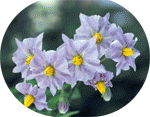| Abstract Detail
Breeding and Genetics Castro, Caroline [1], Pereira, Arione [1], Costa, Delorge [1], Choer, Eva [1], Mentz, Lilian [2], Augustin, Eliane [1], Viégas, Judith [3], Gomes, César [1], Campos, Ângela [1], Pedroso, Roberto [1], Garrastazú, Marilice [1], Barbieri, Rosa Lia [1]. Wild potato genetic resources conserved in Southern Brazil: Current knowledge and future perspectives. SINCE 1986, Embrapa Clima Temperado, Pelotas, RS, Brazil (31°52’S, 52°21’W), has been developing activities aiming to conserve and use wild potato genetic resources that are geographically dispersed in Southern Brazil. Field trips between parallel 26oS and 33oS resulted in collecting more than 250 accessions. At present, 123 accessions are effectively conserved. Of them, 101 belong to Solanum commersonii subsp. commersonii, 18 to subsp. malmeanum and four to S. chacoense subsp. muelleri. These genetic resources have being evaluated for several agronomical traits. For dry matter, the content ranged from 24.05% to 40.08%, in 55 accessions analyzed; The reducing sugar content varied from 0.16% to 2.77% in the autumn cropping season and from 0.12% to 0.67% in the spring cropping season, in 33 accessions evaluated; For resistance to Phythophtora infestans, a sample of 35 accessions varied from susceptible to moderately resistant; The microsporogenesis behavior assessed in 12 accession showed a range of 3.7% to 50.7% of abnormal cells. The pollen viability assessed in 13 accessions by in vitro germination ranged from zero to 78.8%. All accessions were characterized for morphological descriptors. The genetic similarity was estimated among 85 accessions based on isoenzymatic variability. These results indicate that the wild potato germplasm from Southern Brazil carries genes of great interest to be introgressed in the cultivated potato. As future work, crosses will be done between selected wild genotypes and haploids from elite potato clones, besides the evaluation of the germplasm for other traits. As being the Brazilian wild potato gene bank unique, efforts will also be employed for further collect expeditions in order to ensure the preservation of this valuable gene pool.
Log in to add this item to your schedule
1 - Embrapa Clima Temperado, Molecular Biology Laboratory, Br 392, km 78, Caixa Postal 403, Pelotas, RS, 96001-970, Brazil
2 - Universidade Federal do Rio Grande do Sul, Instituto de Biociências, Departamento de Botânica, Av. Bento Gonçalves, 9500, Campus do Vale, Prédio 43433, Porto Alegre, RS, 91501-970, Brazil
3 - Universidade Federal de Pelotas, Instituto de Biologia, Departamento de Zoologia e Genética, Passeio André Dreyfus, prédio 23, Laboratório de Biologia Celular, Campus Universitário, Pelotas, RS, 96010-900, Brazil
Keywords:
Solanum chacoense
Solanum commersonii
pre-breeding
Variability.
Session: Poster-32
Location: Ballroom CD/Monona Terrace
Date: Tuesday, July 25th, 2006
Time: 8:00 AM
Abstract ID:286 |
